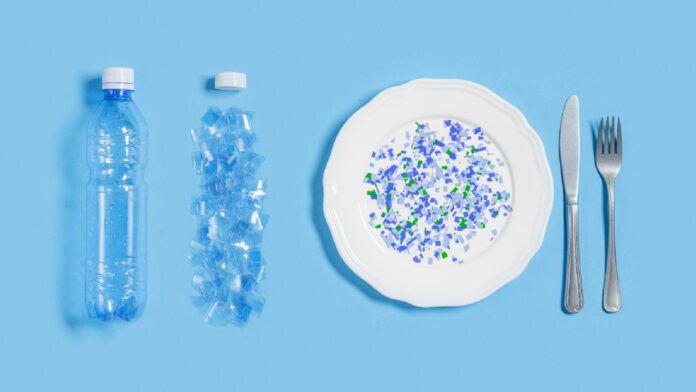Microplastics are found in almost everything we consume, including drinking water. On World Environment Day, let us tell you how microplastics may affect gut health.
Microplastics, which are very small plastic particles, come from the degradation of plastics. They are usually found in numerous foods, including salt, and marine organisms. If you are dependent on bottled water, it means your exposure to microplastics is high. They have also managed to enter vegetables and fruits. Reducing your exposure to microplastics is a must, especially for the sake of your gut health. As people create awareness about the protection of the environment on World Environment Day, celebrated annually on June 5, make sure to protect your health too. Read on to know how microplastics may affect your gut health.
What are microplastics?
Microplastics are tiny plastic particles that less than 5 millimeters in diameter. They are categorised into:
- Primary microplastics that are intentionally manufactured small plastics, such as microbeads used in cosmetics and industrial scrubbers.
- Secondary microplastics result from the breakdown of larger plastic debris through environmental processes like sunlight exposure, and other physical or chemical degradation.
These particles are pervasive in the environment, contaminating water, air and soil, and consequently entering the food chain, says gastroenterology and hepatology expert Dr Vivek Mohan Sharma.

Microplastics have been found in various types of food and drink:
- Fish and shellfish can ingest microplastics from polluted water bodies.
- Sea salt has been found to contain microplastic particles due to ocean contamination, which can occur during the salt production process.
- Bottled water brands may contain microplastics, likely introduced during the bottling process.
- Disposable food containers, often made of plastic, can shed microplastics into the food they hold, especially when exposed to heat. Heating your food in plastic containers, and long storage times affect the amount of the microplastics and their toxic chemicals that get passed on to food, as per a 2020 study published in the Environmental Health journal.
- Vegetables and fruits can absorb microplastics through their roots and transfer those harmful chemical to the plant’s stems, seeds and leaves, according to a 2021 study published in the Nanomaterials journal.
How do microplastics affect gut health?
Microplastics pose a potential risk to gut health through various mechanisms:
1. Inflammation and immune response
Microplastics can induce inflammatory responses in the gut, potentially leading to chronic inflammation, says the expert. The body might treat these tiny particles as foreign invaders, triggering an immune response. This chronic inflammation can disrupt normal gut functions and contribute to diseases such as Crohn’s disease and ulcerative colitis. Microplastics can stay in the body for several days if you don’t pass stool. This can increase the risk of gastrointestinal obstruction and inflammation, as per a 2023 study published in the Nutrients journal.
2. Disruption of gut microbiota
Exposure to microplastics may lead to dysbiosis, changes in the gut microbiome and microbiota, as per a 2021 study published in the Nanomaterials journal. A healthy gut microbiota is essential for digestion, nutrient absorption, and immune function. Disruption can lead to dysbiosis, an imbalance that has been linked to conditions like inflammatory bowel disease (IBD), obesity, and metabolic disorders. The changes in gut flora can also affect the production of essential metabolites needed for gut health, says Dr Sharma.
3. Chemical leaching
Microplastics often contain or adsorb harmful chemicals such as bisphenol A, phthalates, and heavy metals. These substances can leach into the body from the digestive tract, potentially leading to toxic effects and endocrine disruption. These chemicals can interfere with hormone functions and may lead to health issues, including reproductive problems.
4. Physical damage
The physical presence of microplastics in the gut could potentially cause abrasions or other mechanical damage to the lining of the intestines. This can impair the gut barrier function, leading to increased intestinal permeability, often referred to as “leaky gut syndrome.” This condition allows harmful substances to enter the bloodstream, potentially triggering immune responses and inflammation, says the expert.
How to reduce exposure to microplastics?
You can’t do away with microplastics, as they are present almost everywhere. But you can take a few steps for precaution:
1. Reduce plastic use
Minimise the use of single-use plastics such as plastic bags, bottles, and straws. Go for reusable alternatives made from materials like stainless steel, glass, or bamboo.

2. Choose fresh, unpackaged foods
Whenever possible, buy fresh, unpackaged fruits and vegetables. This reduces the chances of plastic contamination from packaging materials. Farmers’ markets and local produce shops often have fewer plastic-wrapped options.
3. Filter tap water
Use water filters that are capable of removing microplastics. Look for filters with a small pore size or those that use reverse osmosis technology, suggests the expert. Regularly replace and maintain these filters to ensure their effectiveness.
4. Be cautious with synthetic fabrics
Synthetic fabrics like polyester and nylon shed microplastics when they are washed. Choose natural fibers like cotton, wool, and silk, and use a washing machine filter to capture microfibers. Also, washing clothes in cold water and using a gentle cycle can reduce microfiber shedding, says the expert.
5. Limit seafood consumption
Since seafood is a significant source of microplastic ingestion, consider reducing your consumption or choosing seafood from less contaminated sources. Look for certifications that indicate sustainable and low-contaminant practices.
6. Proper waste disposal and recycling
Ensure proper disposal and recycling of plastic products to reduce environmental contamination. Be part of community clean-up efforts and support policies aimed at reducing plastic pollution. Educate others about the importance of reducing plastic waste and the impact of microplastics on health and the environment.
Microplastics are tiny plastic particles often found in bottled water and food items. They may have an impact on gut health, so take steps to reduce exposure to microplastics.

